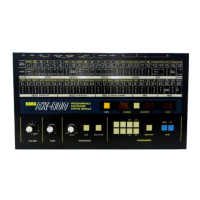3. SOUND SYNTHESIS
What is a Synthesizer
3.3 Digital Access Control System
A synthesizer is a set of modules or “building blocks” that can
be used together to create many different types of sounds. In
all synthesizers, there are three basic types of modules: sound
SOURCES, sound MODIFIERS, and sound CONTROLLERS.
The basic sound SOURCES used in the EX-800 are eight Di
gital Controlled Oscillators (DCOs). The DCOs produce the ac
tual pitches, and the selected DCO WAVEFORM (and selection
of 2 ', 4' Harmonics etc.) has a large effect on the tonal quality
(timbre) of the sound. A NOISE source is also provided.
The sound MODIFIERS for the EX-800 are the Voltage Con
trolled Amplifiers (VCAs), the Voltage Controlled Filter (VCF),
and the Stereo Chorus. Sound modifiers take the basic sound
produced by the sound sources and shape or “fine tune” the
sound into its final form — what you actually hear.
• The VCF modifies the blend of overtones (and brightness)
in the sound.
• The VCAs control the changes in volume level which pro
vide individual note articulation ... how each note attacks, de
cays, etc.
• The Stereo Chorus provides extra warmth and “thickness”
for almost any sound.
The sound CONTROLLERS don’t produce or modify any
sounds directly — they tell the sources and modifiers what to
do. Controllers in the EX-800 include the Keyboard and Key
Assigner, advanced 6-stage Envelope Generators, Modulation
Generator, Programmer, Joystick and MIDI Interface.
Without controllers, there would be no way of coordinating the
different modules in the synthesizer to produce useful sounds.
MIDI (Musical Instrument Digital Interface) is actually an EX
TERNAL Controller, which allows different instruments and
equipment to be coordinated for a wide range of new possi
bilities.
Each of the sources, modifiers and controllers described above
have several PARAMETERS (variable settings such as Wave
form, Cutoff, Attack Time, etc.).
A “Program” is the particular collection of Parameter set
tings that results in a specific desired sound.
On many synthesizers, knobs must be turned to adjust the
Parameters, and it’s hard to tell what the exact values are —
especially when you’re editing an existing program, the most
common way of creating new programs.
On the EX-800, each parameter and its value are expressed
by a pair of numbers:
• The PARAMETER NUMBER (middle two digits of the six
digit DISPLAY) identifies a paraticular Parameter, which
is like a single control knob on other synthesizers (Filter
Cutoff, for example, is Parameter #■-;; on the EX-800).
• The VALUE (righthand two digits) is like the current set
ting of that control knob, or Parameter (e.g., Filter Cutoff
can have a Value between 0 and 39).
The eight Number Buttons (also used for Program Selec
tion), UP and DOWN buttons and large LED Display make
it easy to adjust and DOWN button and LED Display make
it easy to adjust each program parameter precisely for the
exact desired result. To change any aspect of a programmed
sound, you simply:
• select a Parameter Number
• adjust its Value, using the UP and DOWN buttons
• repeat above to change other Parameters, as needed.
Further information is given in the section on “Creating
Sounds”.
OCTAVE
WAVE
FORM
16'
8 '
4 '
2 '
LEVEL
t $
1 1
( J f
• 1 -
1 ~l
<
11 l
I 1
i r
* l!
< r
I ( J
1 ~ l
1 1
HIGH
c ‘ ! \
/ o n 1 ON
! ON
1 ON
1
J 1
,? MID
▲
T
/ LOW
;
n
i—
.
8 0FF
8 0FF
8 OFF
8 0FF
n
u
DC01
Section
-Value
-Parameter number
- Name of Parameter
12

